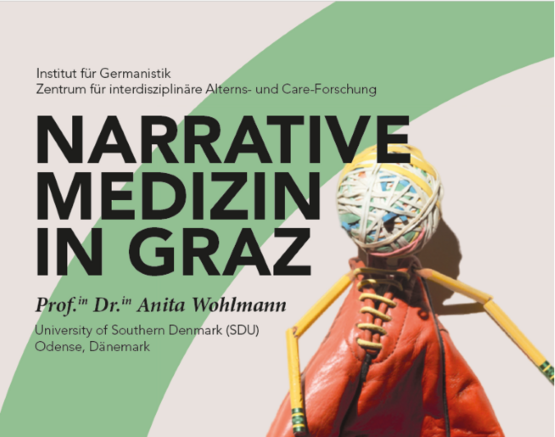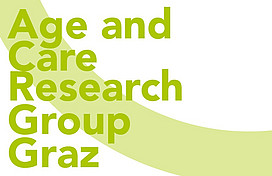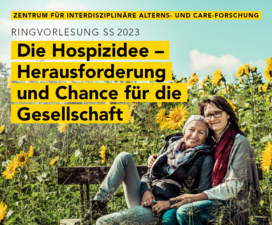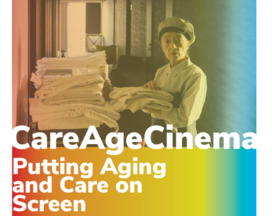Lectures and Workshops
Workshop and Keynote: Approaches to the Concept of Care - Potentials and Challenges for Gender and Aging Studies
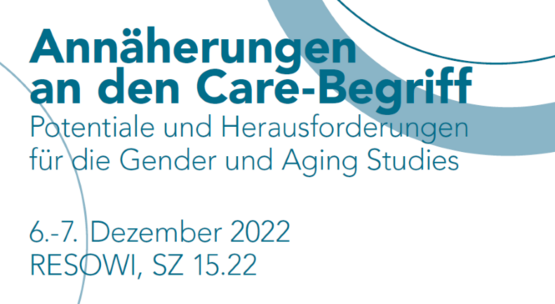
In order to reflect and discuss current debates around the concept of care along concrete research practices in Aging and Gender Studies, the Research Unit Cultural and Gender History at the Institute of History and the Center for Interdisciplinary Research on Aging and Care (CIRAC) are organizing an interdisciplinary lecture and workshop as part of the HuK Forum.
Both Gender and Aging Studies have long been concerned with the broad field of care practices in history and the present. Recently, approaches from care ethics in particular have triggered new insights by newly accentuating the significance of topics such as corporeality, responsibility, and empathy in care relationships in private and public contexts and underlining their socio-cultural and democratic-political relevance.
In this context, care ethics is linked to feminist research traditions: As is well known, these examine unpaid/paid work, gendered concepts of state and private care, or concrete framework conditions of reproductive work in specific situations, their actors, institutions, and intersectionally structured power relations. At the same time, the synopsis of the aforementioned lines of tradition also reveals areas of tension that need to be precisely identified. And also the current debates of care ethics have to be reflected on implications relevant to age(n)science and gender theory as well as on historical depth dimensions.
The workshop will open with a keynote by Helen Kohlen (Vallendar), offer statements on the second day, and focus on a discursive format.
WHEN:
Thurs, Dec. 6, 2022, 6:00-7:30 p.m.: Keynote (as part of the HuK Forum)
By Helen Kohlen (Vallendar): Lines of development in the care debate - care as work and the dimensions of care ethics
With a commentary by Merle Weßel (Oldenburg)
Wed, Dec 7, 2022, 10:00 a.m. to 5:30 p.m.: Workshop
With contributions by Emma Dowling, Louise Earnshaw, Benedikt Grubesic, Andreas Heller, Anna-Christina Kainradl, Ulla Kriebernegg, Patrick Schuchter, Stefan Schweigler, Klaus Wegleitner, Viktoria Wind, Heidrun Zettelbauer
WHERE:
SZ 15.22 (RESOWI Center, Universitätsstraße 15, 2nd floor - entrance Schubertstraße)
More information can be found in the FLYER
Due to limited places, registration for the workshop is strongly requested!
CONTACT and REGISTRATION: genderhistory(at)uni-graz.at or cirac(at)uni-graz.at
The Holocaust: Then and Now, Spanning the Void
Lecture and Workshop by Prof. Dr. Nils Roemer
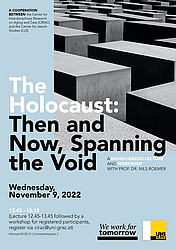
Wednesday, 9 November 2022, 12:45-15:15, HS 02.21, Universitätsplatz 2
Registrations for the workshop by 3 NNovember 2022, to cirac(at)uni-graz.at
The voids and empty spaces in the Jewish Museum in Berlin evoke destruction and absence. The “Memory Void,” one of the symbolic spaces on the grounds of the museum, which was designed by Daniel Libeskind, recalls the Holocaust as well as the many lives that might have been had the millions of people who died in the Holocaust lived to see another day. In his lecture, Professor Roemer will explore absences and voids as important aspects of remembrance. An awareness is apparent in communal and family remembrances but often obscured in public commemorations in museums and on Holocaust remembrance days. Professor Roemer will develop the theme of absence and advance models of remembrance that view the Holocaust as a past event within the context of an annihilated future. The lecture will be followed by a workshop with students of the University of Graz.
The event is a coopearation between the Center for Interdisciplinary Research on Aging and Care (CIRAC) and the Center for Jewish Studies (CJS)
Let’s Fight? Metaphors in Illness Narratives
Lecture by Prof. Dr. Anita Wohlmann, University of Southern Denmark (SDU), Odense, Denmark
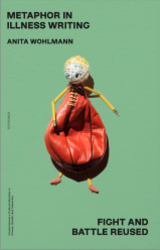
Tuesday, 18 October 2022, 6 pm
Room SZ15.21, RESOWI Center, Universitätsstraße 15, Bauteil A, 2nd floor
The struggling metaphor, as noted by Susan Sontag in her widely read study, "Illness as Metaphor," is one of the most widely used, and perhaps most criticized, metaphors for experiencing illness. Nevertheless, sufferers and medical staff continue to use them. Renowned authors such as Siri Hustvedt, Audre Lorde and David Foster Wallace, who deal with illnesses, “fight” against migraines, cancer and depression in their autobiographical texts. But fight is not the same as fight.
Because metaphors enable a variety of strategies of alternative use, new use, recycling and creative misuse - practices that can be traced in autobiographical texts and transferred to everyday (medical) life. After a brief presentation of the book Metaphor in Illness Writing: Fight and Battle Reused (2022), we will follow examples from medical practice together with the author Anita Wohlmann and rethink established metaphors in a new and different way.
Anita Wohlmann is Associate Professor of Contemporary Anglophone Literature at the University of Southern Denmark, where she conducts research at the Center for Uses of Literature. In addition to American literature, she teaches courses and workshops in narrative medicine and is a founding member and coordinator of the German Network for Narrative Medicine, established in 2019. Her research focuses on metaphors, age and aging, narratives of illness, life writing, disability and serial narration.
N.B. The lecture will be held in German.
Workshop with Anita Wohlmann: Narrative Medicine: Literary Texts and Reflective Writing in the Context of Illness, Healing, and Nursing
Workshop with Prof. Dr. Anita Wohlmann, University of Southern Denmark (SDU), Odense, Denmark
Wednesday, 19 October 2022, 10 am - 4 pm
Place: HS 23.02, Meerscheinschlössl, Mozartgasse 3, EG
Registrations until 7 October to cirac(at)uni-graz.at (Limited number of spots available)
Narrative medicine brings literary studies and medicine together in an unusual way: Not only literary texts but also methods from literary studies are intertwined with central topics such as communication, pain, grief, (self)care and professional identity within the framework of medical training and further education.
In the interdisciplinary workshop, the theories and goals of the program are presented in the form of short impulses and critical aspects are discussed. In addition, experiences from German-speaking countries are reported. However, the focus of the one-day event is on practice: the participants are invited to try out the basic model of narrative medicine - attention, representation, affiliation - for themselves and to reflect together.
Recommended reading:
- Anita Wohlmann, Pascal O. Berberat, Daniel Teufel. Narrative Medizin: Ein Praxisbuch für den deutschsprachigen Raum. Böhlau, 2021.
- Rita Charon. “Narrative Medicine: Attention, Representation, Affiliation.” Narrative 13.3 (October 2005): 261-270.
N.B. The workshop will be held in German.
